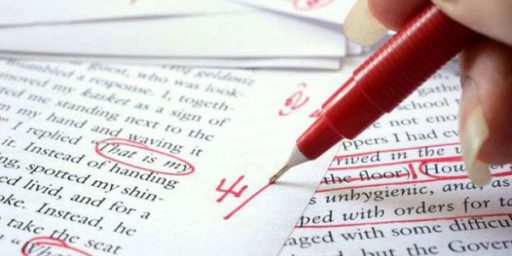Where Have All the Editors Gone?
Grammar and spelling errors abound at all but a handful of news sites.

Reading a story at the once-venerable Newsweek that was otherwise unremarkable, I noted two instances of the possessive pronoun its misspelled as the contraction it’s.
By itself, that’s not the biggest deal in the world. Newsweek has fallen on hard times and has become a shadow of the best newsweekly in the country it was not all that long ago and it’s just one story about a segment on a late-night talk show. But I’m seeing this thing routinely on credible sites.
I see two things at work here, both of which seem to be trends in the magazine and newspaper business.
First, we’re seeing ever-younger and less-seasoned journalists being hired at prestige outlets. The young reporter in question here is just out of school, where she had an impressive career as a collegiate swimmer. But ten, certainly twenty, years ago she would have spent quite a bit of time working at less-visible outlets before being brought up to the big leagues.
Second, not long ago at all, even a local paper would have tightly edited a cub reporter’s work. Even educated people have holes in their command of grammar and syntax coming out of school; they need the tutelage of a seasoned pro to whip their writing into shape. And a prestige outlet like Newsweek would have several layers of editors to do fact-checking, proofreading, and otherwise tighten the copy. Even seasoned professionals benefit from having good editing. I know I do.*
Having done quite a bit of freelance writing for these outlets, I’ve noticed a considerable drop-off in editing. I’ve been embarrassed more than once to see glaring errors in what I thought was the initial draft of an article go straight to press.
Some of it is presumably economics: editing costs money and good editors cost more money. So, the prestige outlets have gone from seasoned editors to kids a couple years out of school and those a couple rungs down the ladder have all but dispensed with editors.
One imagines the fast-paced nature of the Internet and the “please excuse typos, sent from my iPhone” culture have added to the problem. It may simply be that Newsweek doesn’t think it matters if errors in grade-school grammar appear under its masthead anymore.
_______________
*Blogging and other social media, which are less formal expressions and typically written, are different. I’ve made plenty of its/its and their/they’re type errors on OTB out of haste. I’ll typically go back and correct those if I spot them later on but it’s not the same as writing for a professional outlet where one expects a finished product.






I’ve noticed the same thing in several mainstream publications. One gets the impression that the pressure to be the first one to hit “Publish” and get the story up on the web is causing news sites to let things like this slide.
Not that I’m perfect, mind you, I know I’ve made errors myself online over the years, some more apparent than others. Indeed, when I go back and read some of the things I wrote nearly 14 years ago when I started blogging, I kind of cringe at the dumb mistakes I made. I’ve learned to double-check before publishing but that’s not always perfect because, like many people I think, I’ve found that I’m not as good at proofreading my own work as I am when proofreading someone else. I think that’s partly because my brain skips over the errors or something.
In any case, I’ve come to rely on a Chrome plug-in called Grammarly to pick up on the more obvious errors, but I’m sure something still slips by.
When it comes to publications like Newsweek, though, I expect better.
@Doug Mataconis: Yes, as I added to a quick revision to the post before reading your comment, I think blogging and social media are different animals.
I ranted about this a week or so so, though I was referring, mostly, to semi-literate pro-Trump blogs masquerading as news sites and their commenters.
In book publishing, where the vast majority of editors are now acquisitions editors, copy editors became an unjustifiable expense.
You might want to look at the statistics a little more closely. The median age of a reporter has actually risen sharply over the years.
I think there are some other factors you might consider. Increased reliance on visual media means that grammar, punctuation, and written style just aren’t as important. Increased reliance on automation has reduced payrolls and sped up the process but it’s also resulted in more errors of certain types as anyone who has experienced autocorrect can testify.
There are some studies that have suggested that fashions, the emphasis in education have resulted in kids not learning to spell as they used to. There may just be fewer people who know how to spell.
Editors cost money. And most of these news sites are bleeding red ink out the wazzoo. Cut editors to save costs. That’s all.
@Dave Schuler: I think the last part of what you write—which is a longstanding argument of yours—is surely right. I’m not sure about this, though:
Rather, I presume you’re right. People work longer than they used to and there is no mandatory retirement ago. Plus, we insist on college education for reporters now and didn’t always in the past. But my sense was that one didn’t get a job writing for Newsweek or the New York Times or the like right out of school in the old days without putting in some time in Tampa or Albuquerque.
Come to think of it, this problem goes back earlier. In Arthur Miller’s 1972 memoir Timebends, the following sentence appears: “Eating a sandwich, the sun went down.”
No editor called Miller on it.
The most annoying thing, to me, is when people leave entire out of sentences.
@CSK: Well that explains why I am seeing more errors in novels, even best selling authors.
Here’s a little corroboration. The situation is even more aggravated now—the median age is 48.
@Tyrell:
Those aren’t edited; they’re printed as is.
With the Advent of texting and writing on blogs I find that I mostly don’t care if I get it’s and it’s correct. I get autocorrected into wrong words all the time, but don’t worry too much if I miss it. I think that general sentiment is common among most of the under 30 crowd. Other that the most formal writing I think I mostly agree with them. Of course I have been persecuted by my grammar Nazi wife for years, so maybe I am reacting to far the other way.
Steve
Just to say the obvious: I know I need an editor (as readers here will readily attest). It is just too easy to think your have written what you thought you have written as opposed to what you actually wrote (and the brain, or at least mine does, has a tendency to even see what you wanted, not what you wrote, on an initial re-read). Let it sit for a while (or, have it make print) and then the errors jump out.
I am sure this is a function of technology, cost, and urgency. Between grammar and spell-check, there is a (faulty) assumption that the tech will catch errors (and hence save money on someone doing it for the writers). And then, clearly, there is haste in the current media environment to get published ASAP.
BTW: age may play a part, but I don’t think even well-published, experienced authors are immune from dumb mistakes and typos. I co-authored a book with 3 other full professors, all with far more extensive publishing records than I, and we all proofed the manuscript multiple times before submission. The copy editor for Yale University Press still found lists of errors. And even after all of that, I have still found errors/typos in the published text.
There’s an apocryphal story regarding punctuation and the roots of the Mexican Revolution.
Porfirio Diaz opposed Benito Juarez, allegedly under the slogan “Effective suffrage. No reelection!” He rose to the presidency only after Juarez died (of natural causes, remarkably enough), and then went on to seize all the power he could, and get himself reelected for the next thirty years.
The story is that his slogan was misunderstood. What he really meant was “Effective suffrage no. Reelection!”
As jokes go, this one’s feeble.
@Steven L. Taylor: Yup. I’m a pretty clean first-draft writer and spent some fifteen years editing the work of accomplished writers. Not only do pretty much all of them need substantial editing but so do I. It’s just much harder to find your own errors, absent a long cooling off period, than someone else’s.
@Steven L. Taylor:
Hey, I’m glad someone realizes this as well.
Some of my work involves making up long lists of products, then adding cost, margin, price, tax, and brand to each. I am careful and I check my work, but I let plenty of mistakes go by, precisely because I keep seeing what I thought I typed and not what’s actually on the screen or page. That’s why I insist someone else do additional checks.
@Teve: That one and its cousin: the introductory clause that has become so long that the author puts a period there and fails to finish the sentence.
As if to provide an illustration of all this, one of co-authors from the book in question e-mailed me this morning to ask if I had ever paid attention to the LOC information on the copyright page of the book. Such info has the birth year of the author. Mine is 20 years off in that book. Someone clearly just misread or mistyped 1968 as 1948.
I have no idea why he noticed, BTW.
@CSK: I expect that explains a lot of what I see in the ebooks I download, too.
“With the Advent of texting and writing on blogs I find that I mostly don’t care if I get it’s and it’s correct. I get autocorrected into wrong words all the time…”
When I first started teaching Composition all those years ago, I advised my students to not use autocorrect because it tended to make mistakes worse rather than better. Good to know that AI hasn’t changed that principle.
@James Joyner: ho ho ho. I discovered this the hard way back in Japan after writing up a report (in English) based on a survey I had drawn up and written up in Japanese. All the responses to the survey were of course in Japanese…after collating all the responses and running the statistical analysis I wrote what had to have been the most Japlish report EVAH.
It took me at least three rewrites to turn the report into something that was understandable by someone who didn’t read Japanese.
I was reading Sacrament by Clive Barker last night, and I read the same sentence three or four times, uncomprehending, until I realized that the word “now” should have been the word “not”.
@Just nutha ignint cracker:
In David Lodge’s Thinks… (2001), one of the principal characters (a university professor of IA) is trying to teach the other principal how to do email. He tells her to ignore capitalization, punctuation, and any typos in the text because they don’t count in email. She replies, rather tartly, that since she’s spent her professional life instructing people to correct their writing errors, she can hardly ignore her own.
Did you mean “possessive pronoun”?
David Foster Wallace wrote extensively about this in a 2001 Harper’s article titled Tense Perfect. Part of the editing equation is whether the editor is a prescriptivist or a descriptivist. From the late eighties onward there has been a descriptivist movement in writing, where the grammatical rules are more flexible and culturally-bound. This perspective has seeped into all secondary and higher education courses, causing a new generation of readers, writers, and academics to focus more on content than structure. One of the few places where the structure had a distinct focus is in the field of linguistics.
@Anthony Clemons: I routinely violate some Shrunk and White “rules” to make writing more interesting and like normal speech. And think there are stylistic reasons to violate rules of formal English. But I can think of no value in simple misspelling or homonym errors.
FWIW I have known professional writers who had little but scorn for Strunk and White. Not being a professional writer, I didn’t really understand their criticisms very deeply, but one of them, a journalist named Mike, told me “the stupid, stupid idea that you shouldn’t split an infinitive is a holdover from when idiot grammarians tried to make English like Latin, which it isn’t.” I only vaguely know what that means, but maybe some of the more experienced writers here will get something out of it.
Har Har Har 🙂
Holy Shit I think I just saw on Facebook a mystical beast never before seen in the wild. The legendary Quintuple-Negative.
@CSK: The Vice President of Instruction at a 2-year college I used to work at used to write all of her emails in lower case all the way through. Her reasoning–stated publicly several times–was that as a holder of a terminal degree in English, she “permitted herself to transcend the conventions as it suited her.”
(The best explanation that I’ve ever heard for a convention for writing email in lower case is that the DARPA-NET people couldn’t be bothered with using the shift key. The other one I’ve heard is that early computer languages didn’t use any capital letters, so writing with capitals would have required additional coding. I don’t know if either is true, but either one would have been a better explanation than our VP gave.)
@Teve: Clever! But I don’t see “oppose,” “removing,” and “exemptions” as negative per se; though they certainly negative by connotation.
Hey, we’re all human. In my newly-published novel, I wrote “onocologist” instead of “oncologist.” In spite of multiple rounds of critiquing and a professional edit, it made it into the final copy. Seriously, the urge to scoop the competition has given new life to the adage “haste makes waste.”